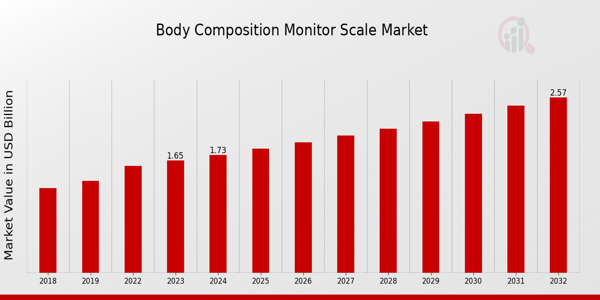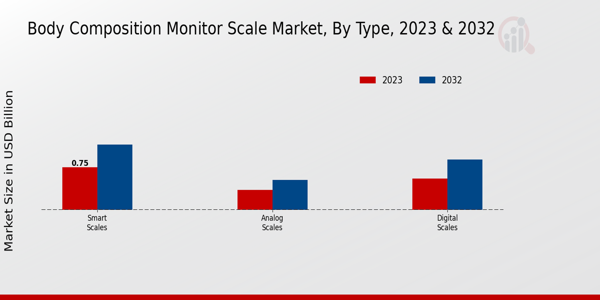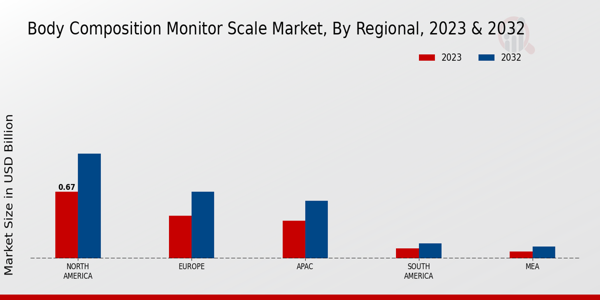Body Composition Monitor Scale Market Overview:
As per MRFR analysis, the Body Composition Monitor Scale Market Size was estimated at 1.82 (USD Billion) in 2024. The Body Composition Monitor Scale Market Industry is expected to grow from 1.91 (USD Billion) in 2025 to 2.99 (USD Billion) till 2034, at a CAGR (growth rate) is expected to be around 5.08% during the forecast period (2025 - 2034).
Key Body Composition Monitor Scale Market Trends Highlighted
The Body Composition Monitor Scale Market is driven by the rising awareness of health and fitness among consumers, leading to an increased demand for home health monitoring devices. An emphasis on preventive healthcare and maintaining a healthy lifestyle is prompting individuals to monitor their body composition, such as muscle mass, fat percentage, and hydration levels. Additionally, the growing prevalence of obesity and associated health issues is stimulating the need for effective tools that can help track weight management and overall health. The integration of advanced technologies, such as Bluetooth and app connectivity, enhances the user experience, making these scales more appealing.Opportunities abound in the market, particularly in the development of innovative and user-friendly devices. As health-conscious consumers look for more information about their bodies, brands can cater to this need by providing detailed analytics and personalized recommendations based on the data collected. Collaborations with fitness apps and nutrition programs can further enhance the value of these scales. The growing trend of wearable technology can also be leveraged, allowing seamless integration and data sharing that caters to modern consumer needs. Recent trends reveal a strong inclination towards smart and connected devices. Consumers are increasingly looking for scales that not only measure weight but also provide comprehensive body composition analysis.The emergence of smartphone applications is making it easier for users to track their progress over time and engage more deeply with their health data. Furthermore, the focus on aesthetic design and functionality is shaping product offerings, appealing to a broader audience beyond health enthusiasts. Overall, the market continues to evolve, driven by technological advancements and changing consumer preferences.

Source: Primary Research, Secondary Research, MRFR Database and Analyst Review
Body Composition Monitor Scale Market Drivers
Increasing Health Awareness and Fitness Trends
The Body Composition Monitor Scale Market Industry is experiencing a significant boost due to the rising awareness of health and fitness among consumers. As people become more conscious of their overall health and well-being, there is an increasing demand for tools and devices that provide insights into body composition. Health consciousness is driving individuals to monitor their weight, fat percentage, muscle mass, and other metrics that can be obtained through body composition scales.Furthermore, the surge in fitness-related activities and the proliferation of fitness centers and personal training programs are increasing the need for effective monitoring solutions. Consumers are seeking accurate and reliable equipment that can help them track their progress and make informed decisions about their health. This trend aligns with the broader shift towards preventive healthcare, where individuals aim to identify potential health issues before they become serious concerns.By prioritizing body composition analysis, users are not only focused on weight loss but also on achieving a balanced physique, improving physical fitness, and enhancing athletic performance. The integration of technology in these devices, such as Bluetooth connectivity, smartphone apps, and detailed analytics, supports this trend by providing consumers with the information they need to set realistic goals and maintain motivation.
As the demand for personalized health solutions continues to grow, the Body Composition Monitor Scale Market Industry is poised for expansion as manufacturers innovate and develop more advanced products that cater to these health trends.
Technological Advancements in Monitoring Devices
Technological advancements are significantly driving growth in the Body Composition Monitor Scale Market Industry. Innovations in measurement techniques, such as bioelectrical impedance analysis (BIA), have improved the accuracy and reliability of body composition data. Newer devices incorporate features like wireless connectivity, app integration, and comprehensive data analysis, making them more attractive to users. As technology improves, the scales are becoming easier to use and providing more detailed insights that appeal to the growing tech-savvy consumer base.This has expanded the scope of the market as manufacturers innovate to include user-friendly designs and features that cater to a wider audience.
Growing Demand in the Healthcare Sector
The healthcare sector is increasingly adopting body composition monitoring devices for clinical assessments and patient management. Medical professionals are incorporating these tools into routine health evaluations to monitor patients' body fat, muscle mass, and hydration levels, providing valuable insights for treatment plans. This rise in demand from the healthcare industry is driving the growth of the Body Composition Monitor Scale Market Industry, as healthcare providers recognize the importance of body composition analysis for optimizing health outcomes.
Body Composition Monitor Scale Market Segment Insights:
Body Composition Monitor Scale Market Type Insights
The Body Composition Monitor Scale Market encompasses various types, each serving different consumer preferences and technological advancements. In 2023, the overall market was recognized at a value of 1.65 USD Billion, with a noticeable trend towards innovative solutions, particularly in the smart scales segment, which holds a significant market share of 0.75 USD Billion.
Smart scales are becoming indispensable as they integrate advanced technologies, offering features like connectivity with mobile applications for better health tracking. As the market witnesses a rising inclination towards personal health management and technological innovation, the segment is projected to reach a valuation of 1.15 USD Billion by 2032, showcasing its growth potential.
Analog scales, valued at 0.35 USD Billion in 2023, represent a traditional approach to measuring body composition, appealing to consumers seeking simplicity and reliability. Although this segment is expected to grow to 0.53 USD Billion by 2032, it reflects a slower growth trajectory compared to its counterparts, as technological advancements drive demand for more sophisticated measuring devices.
Digital scales, valued at 0.55 USD Billion in 2023, are also playing a crucial role in the market with their blend of accuracy and user-friendly features. Projecting a value of 0.89 USD Billion by 2032, this segment's consistent growth highlights its ability to cater to a broad audience who values both functionality and ease of use.
In terms of market dynamics, the significance of smart scales is prominent as they dominate the market due to their multifunctional capabilities, incorporating features like body fat percentage, muscle mass, and other metrics. The increasing awareness of health consciousness among individuals fuels the demand for such products, and the convenience of technology-driven devices makes them appealing to consumers. In contrast, analog scales and digital scales cater to a section of the market that prefers either nostalgia or enhanced convenience.
The Body Composition Monitor Scale Market data indicates a healthy growth trajectory driven by rising health awareness among the population, thus creating an environment ripe with opportunities for development across all types. Consequently, the future of the market is bright, with significant potential for all segments but particularly for smart scales due to their innovative nature, making them a pioneering force in the Body Composition Monitor Scale Market industry.

Source: Primary Research, Secondary Research, MRFR Database and Analyst Review
Body Composition Monitor Scale Market Application Insights
The Body Composition Monitor Scale Market, valued at 1.65 billion USD in 2023, showcases significant potential within its Application segment, which encompasses various key areas such as Fitness Monitoring, Health Management, and Weight Loss Programs. Each of these applications plays a crucial role in encouraging individuals to track and improve their body composition, thereby facilitating healthier lifestyles. Fitness Monitoring has emerged as a major driving force as consumers increasingly seek tools to enhance their exercise effectiveness and maintain a balanced physique.Health Management also holds importance, as it supports individuals in managing chronic conditions and overall wellness, fostering a proactive approach to health. Meanwhile, Weight Loss Programs dominate the market, reflecting a growing awareness of obesity and related health issues, prompting more individuals to invest in body composition analysis tools. The alignment of these applications with rising health consciousness is anticipated to fuel further market growth as users seek reliable solutions for monitoring their health metrics effectively.Collectively, these factors contribute to the evolving landscape of the Body Composition Monitor Scale Market, enhancing its relevance and vitality in contemporary society.
Body Composition Monitor Scale Market Feature Insights
The Body Composition Monitor Scale Market, valued at 1.65 billion USD in 2023, is experiencing steady market growth driven by innovative features that enhance consumer experience and health monitoring capabilities.
Within the feature segment, various functionalities, such as Bluetooth Connectivity and various measurement parameters, play a crucial role in shaping consumer preferences and driving sales. Bluetooth Connectivity has become increasingly vital as it allows users to sync data with mobile devices, making health tracking more accessible and interactive.Body Fat Percentage Measurement is another significant feature, as consumers focus on comprehensive fitness assessments and maintaining healthier lifestyles. Moreover, Muscle Mass Measurement offers insights crucial for fitness enthusiasts aiming to optimize their training regimens.
The inclusion of Bone Density Measurement also caters to an aging population concerned about bone health, solidifying its importance in the body composition landscape. The trends indicate a shift toward smart devices with connectivity and personalized health data, reflecting the market's adaptation to consumer needs and technological advancements.The interplay of these features not only enhances the user experience but also showcases the broader potential for growth within the Body Composition Monitor Scale Market industry.
Body Composition Monitor Scale Market End-Use Insights
The Body Composition Monitor Scale Market has demonstrated robust growth, with the market expected to reach a value of 1.65 USD billion in 2023 and continue its upward trajectory. Within the End-use spectrum, the market is divided into Home Use, Commercial Use, and Healthcare Facilities, reflecting diverse applications catering to individual and professional needs. Home Use signifies a significant portion of the market, contributing to personal health monitoring trends as individuals increasingly focus on wellness and fitness. Meanwhile, the Commercial Use segment, which encompasses fitness centers and gyms, highlights the increasing incorporation of advanced monitoring technologies to attract customers and enhance fitness services.Healthcare Facilities also play a pivotal role, as hospitals and clinics increasingly adopt body composition monitors to support patient health assessments and treatment plans. The interdependence of these segments drives the Body Composition Monitor Scale Market revenue as consumer awareness and focus on health continues to rise, creating numerous opportunities for market growth and innovation.
Body Composition Monitor Scale Market data reveals a continuous shift towards technology integration in these sectors, promoting accuracy and user engagement in health management. Overall, the market statistics reflect the growing importance of body composition monitoring across diverse end-use categories.
Body Composition Monitor Scale Market Regional Insights
The Body Composition Monitor Scale Market revenue showcases a diverse distribution across various regions, with North America holding a majority stake, evaluated at 0.67 USD Billion in 2023, and projected to grow to 1.05 USD Billion by 2032, reflecting its significant demand and consumer awareness regarding health and fitness.
Europe follows closely, generating 0.43 USD Billion in 2023, with growth to 0.67 USD Billion anticipated by 2032, bolstered by rising trends in wellness and preventive healthcare. The APAC region, valued at 0.38 USD Billion in 2023, is also emerging as a vital market, expected to reach 0.58 USD Billion in 2032, thanks to increasing health consciousness among the population.Meanwhile, South America, with a valuation of 0.1 USD Billion and MEA at 0.07 USD Billion, reflect smaller yet steadily growing markets, projected to rise to 0.15 USD Billion and 0.12 USD Billion, respectively, by 2032. These Body Composition Monitor Scale Market statistics reveal not only the current market dynamics but also the opportunities that can be harnessed in regions with high growth potential.

Source: Primary Research, Secondary Research, MRFR Database and Analyst Review
Body Composition Monitor Scale Market Key Players and Competitive Insights:
The Body Composition Monitor Scale Market is characterized by a competitive landscape where multiple players strive to innovate and capture market share through advanced technology and extensive product offerings. As awareness regarding health and fitness increases among consumers, the demand for body composition monitors is on the rise, prompting companies to enhance their competitive strategies. Key trends include the integration of smart technology into scales, enhanced accuracy backed by scientific research, and the emergence of user-friendly interfaces for better consumer engagement. Manufacturers are increasingly leveraging data analytics and connectivity features to appeal to health-conscious individuals, thus intensifying the competition. In this dynamic industry, understanding market positioning, consumer preferences, and technological advancements is critical for companies aiming to lead in this segment.Tanita stands out in the Body Composition Monitor Scale Market by offering a diverse range of products known for their accuracy and reliability. The company has established a strong brand presence due to its commitment to quality and innovation, which resonates well with both health professionals and fitness enthusiasts. Tanita's strength lies in its extensive research and development efforts aimed at producing body composition monitors that accurately assess body fat, muscle mass, and other vital metrics. The company is well-recognized for its digital and multifunctional scales, integrating features such as Bluetooth connectivity and smartphone compatibility, which cater to a tech-savvy consumer base. Furthermore, Tanita has built solid partnerships with healthcare providers and fitness organizations, further enhancing its credibility and reach in the market. Such strategic moves enable Tanita to maintain a competitive edge, appealing to consumers who seek precision and comprehensive health data.AccuCheck, a significant player in the Body Composition Monitor Scale Market, is noted for its user-friendly devices that focus primarily on simplicity without compromising functionality. The company's strengths lie in its ability to create products that are not only easy to use but also deliver crucial health insights in a format that is accessible to the average consumer. AccuCheck capitalizes on the growing trend of self-monitoring health metrics at home by providing scales that often feature clear displays and straightforward analytics. Their marketing strategies focus on promoting wellness and proactive health management, which resonate within the growing demographic of health-conscious individuals. The integration of innovative technologies, such as mobile app connectivity and detailed health tracking, positions AccuCheck favorably against its competitors. By maintaining a keen focus on consumer needs and market trends, AccuCheck continues to strengthen its position within the increasingly competitive landscape of body composition monitors.
Key Companies in the Body Composition Monitor Scale Market Include:
- Tanita
- AccuCheck
- Xiaomi
- Nokia
- ICE
- Kinsa
- Withings
- Omron
- Salter
- Etekcity
- Fitbit
- Rowers
- Soehnle
- Smart Weigh
- Weight Watchers
Body Composition Monitor Scale Market Industry Developments
Recent developments in the Body Composition Monitor Scale Market include active innovation and competition among key players such as Tanita, AccuCheck, Xiaomi, and Fitbit. These companies are increasingly investing in advanced technology to enhance their product offerings, with a particular focus on smart scales equipped with Bluetooth and app integration to provide users with detailed insights into their body composition. Current affairs indicate that market growth is being driven by rising health awareness and an increasing number of fitness enthusiasts seeking accurate monitoring tools.
Significant valuation growth has been observed in companies like Withings and Omron, which suggests a positive impact on overall market dynamics. Mergers and acquisitions are becoming prevalent as companies aim to consolidate their market positions; however, no specific recent mergers or acquisitions within the aforementioned companies have been reported. The competitive landscape remains robust, with many firms extending their portfolios to include features that track not only weight but also muscle mass, fat percentage, and overall health metrics. This represents a shift towards comprehensive health management solutions, reflecting evolving consumer demands for multifaceted product capabilities.
Body Composition Monitor Scale Market Segmentation Insights
- Body Composition Monitor Scale Market Type Outlook
- Smart Scales
- Analog Scales
- Digital Scales
- Body Composition Monitor Scale Market Application Outlook
- Fitness Monitoring
- Health Management
- Weight Loss Programs
- Body Composition Monitor Scale Market Feature Outlook
- Bluetooth Connectivity
- Body Fat Percentage Measurement
- Muscle Mass Measurement
- Bone Density Measurement
- Body Composition Monitor Scale Market End-Use Outlook
- Home Use
- Commercial Use
- Healthcare Facilities
- Body Composition Monitor Scale Market Regional Outlook
- North America
- Europe
- South America
- Asia-Pacific
- Middle East and Africa
| Report Attribute/Metric |
Details |
|
Market Size 2024
|
1.82 (USD Billion)
|
|
Market Size 2025
|
1.91 (USD Billion)
|
|
Market Size 2034
|
2.99 (USD Billion)
|
|
Compound Annual Growth Rate (CAGR)
|
5.08 % (2025 - 2034)
|
|
Report Coverage
|
Revenue Forecast, Competitive Landscape, Growth Factors, and Trends
|
|
Base Year
|
2024
|
|
Market Forecast Period
|
2025 - 2034
|
|
Historical Data
|
2020 - 2024
|
| Market Forecast Units |
USD Billion |
| Key Companies Profiled |
Tanita, AccuCheck, Xiaomi, Nokia, ICE, Kinsa, Withings, Omron, Salter, Etekcity, Fitbit, Rowers, Soehnle, Smart Weigh, Weight Watchers |
| Segments Covered |
Type, Application, Feature, End Use, Regional |
| Key Market Opportunities |
Rising health consciousness, Increasing fitness trends, Advancements in sensor technology, Growth in e-commerce platforms, Integration with mobile applications |
| Key Market Dynamics |
rising health consciousness, increasing fitness trends, technological advancements, growing demand for home fitness, integration with health apps |
| Countries Covered |
North America, Europe, APAC, South America, MEA |
Frequently Asked Questions (FAQ) :
The market is expected to be valued at 2.99 USD Billion in 2034.
The expected CAGR for the market is 5.08% from 2025 to 2034.
North America is projected to hold the largest market share, valued at 1.05 USD Billion in 2032.
Smart Scales are expected to be valued at 1.15 USD Billion in 2032.
Major players include Tanita, AccuCheck, Xiaomi, Nokia, and FITBIT, among others.
Digital Scales are projected to be valued at 0.89 USD Billion in 2032.
The APAC region is expected to reach a market value of 0.58 USD Billion in 2032.
Analog Scales are projected to have a market value of 0.53 USD Billion in 2032.
Key growth drivers include increasing health awareness and demand for home monitoring devices.





























